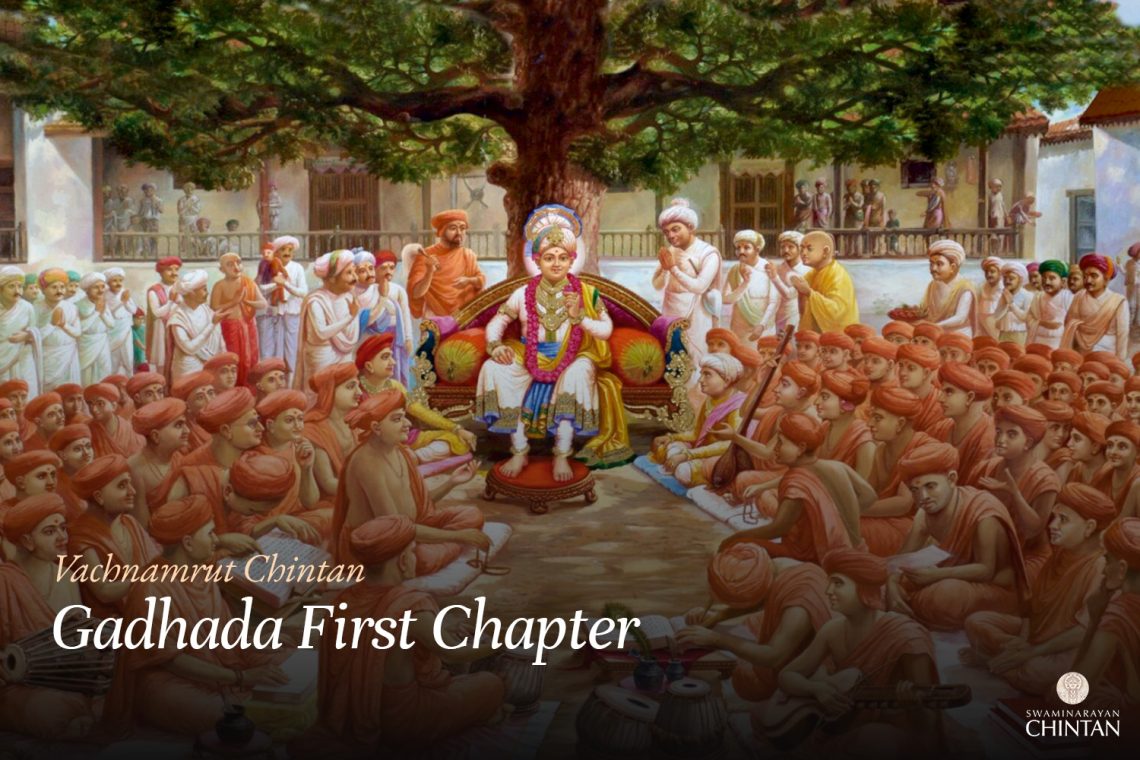Central Insights:
- The reason for developing extraordinary love for God.
Key Points:
- Faith in the human personality of Bhagwan, theism, and greatness are the reasons for extraordinary love for God.
- If the love is subtle, it becomes apparent through continuous association with satsang (affection with a great saint).
- The company of great saints also contributes to developing extraordinary love for God.
Explanation
In this Vachanamrut, Muktānand Swāmi posed a question: “O Maharaj! What is the reason behind developing extraordinary love for God?” In response, Shreeji Maharaj stated: “One reason is having faith in the personality of Paramātmā, believing firmly that He is indeed God, along with theism and knowing God’s divine powers as the God of Goloka and other abodes, the creator, sustainer, and destroyer of countless universes, and the omnipresent inner controller. When one perceives this greatness of Maharaj, they develop extraordinary affection for Him. The more one realizes the divine qualities and divinity in Maharaj’s human form through His divine play and the path of salvation, the more extraordinary love they develop for Him.”
Here, the terms faith and theism are used together, signifying slightly different meanings. Typically, these terms are used interchangeably, but here, faith implies realizing the greatness of the abode and theism implies perceiving the transcendental benevolence in Maharaj’s human form. This can be interpreted in such a manner.
Muktānand Swāmi further inquired: “What if someone knows the greatness of Bhagwan but does not develop extraordinary affection?” Maharaj explained: “Even if someone knows this greatness, they possess extraordinary affection for God, but they may not realize it. Just as Hanumanji had immense strength, and Baldevji had immense strength, but it was not apparent until someone pointed it out. Similarly, they possess extraordinary love for God, but it is not evident.”
Muktānand Swāmi asked again: “How can the strength of this affection be realized?” Maharaj replied: “Through continuous association with satsang, the strength of this affection becomes apparent.” Muktānand Swāmi then asked: “Is the cause of auspicious or inauspicious times, places, and actions the association, or is it something else?” Maharaj explained: “The earth is referred to as the place, which does not change based on individuals. It is considered the same everywhere. Time is also considered the same, but in a country where exceptionally great and powerful individuals reside, their influence can transform an inauspicious place, time, and action into auspicious ones. Conversely, if a country is inhabited by extremely sinful individuals, even a good place, time, and action become inauspicious due to their influence. Thus, the cause of auspicious and inauspicious places, times, and actions are individuals. If an individual is exceptionally capable, they can transform places, times, and actions according to their nature, impacting the entire world, their country, region, village, or household based on their capability.”
‘The king is the cause of the times’ refers to the idea that a leader can influence the times. Here, ‘times’ refers not to days, months, or years, but to eras such as Satya Yuga, Dvapara Yuga, Treta Yuga, and Kali Yuga. A leader can establish the righteousness of Satya Yuga even in Kali Yuga. By honoring the love and governance of a righteous and benevolent leader, the entire populace abandons sinful actions and becomes virtuous. Thus, even in Kali Yuga, a Satya Yuga atmosphere can be created, making the leader the cause of Satya Yuga. However, this does not affect lifespan, physical strength, etc.
Maharaj here stated that just as great individuals, according to their capabilities, can transform actions and the environment based on their nature—be it on the earth, their country, region, village, or household—by altering the time and actions, the earth is also considered to be transformed into a good country. Therefore, Maharaj states that the cause of auspicious or inauspicious places, times, and actions are the two types of individuals, good and bad.
In the teachings of Sadguru Gunātitānand Swāmi, it is also mentioned that one wicked individual can encompass the entire eight inauspicious elements related to the place, transforming the entire area negatively through association. Conversely, the influence of one righteous individual can transform the entire area positively.
Glossary
| Dvapara Yuga – Third Age The era before Kali Yuga, during which Bhagwan Krishna incarnated. |
| Eight Inauspicious Elements – Negative Influences Includes ego, lust, anger, greed, jealousy, hypocrisy, stubbornness, and attachment. Maharaj emphasizes removing these through satsang to become a true devotee. |
| Golok – The divine abode of Bhagwan Krishna |
| Kali Yuga – Present Age The age of materialism and spiritual decline. |
| Paramatma – Supreme God |
| Righteous Leader – A leader who upholds truth and spiritual values |
| Satya Yuga – Age of Truth The first and most righteous era in the cycle of time. |
| Treta Yuga – Second Age The age in which Bhagwan Ram incarnated. |

